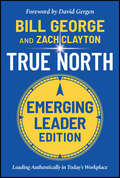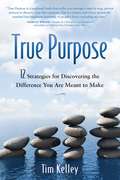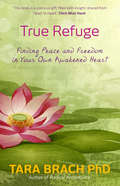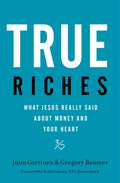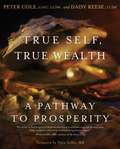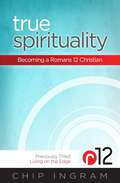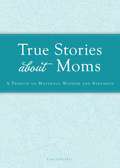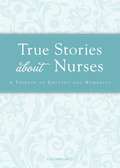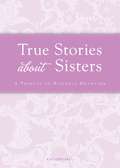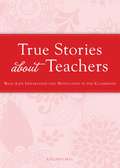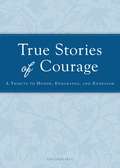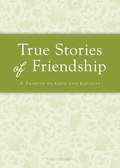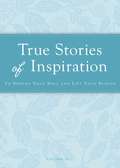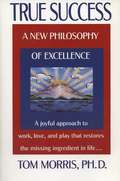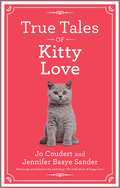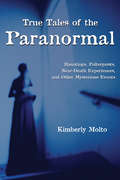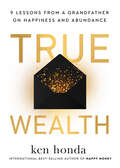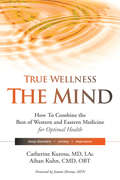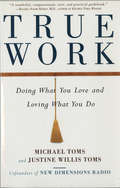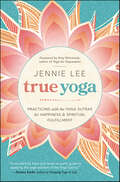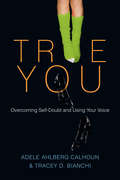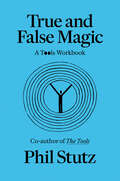- Table View
- List View
True North: Leading Authentically in Today's Workplace, Emerging Leader Edition
by Bill George Zach ClaytonA Clarion Call to Emerging Leaders: Step Up and Lead Now! In True North: Emerging Leaders Edition, renowned leadership expert Bill George and Millennial tech entrepreneur Zach Clayton issue the challenge to emerging leaders—from Gen X to Millennials and Gen Z—to lead their organizations authentically through never-ending crises to make this world a better place for everyone. Emerging leaders do so by discovering their &“True North&”—who they are—and then finding their &“North Star&”—their leadership purpose. To navigate today&’s complexities, George and Clayton show emerging leaders how to lead with their hearts, not just their heads, with passion, compassion, and moral courage by being true to their values to reach their full potential as they take on great challenges and navigate complex issues. Harvard professor Bill George, with four best-selling books to his credit including the timeless classic True North, is the former CEO of Medtronic who established authentic leadership in 2003. He teams up with Zach Clayton, an emerging leader still amid his own leadership development journey, to give emerging leaders the definitive guide for leading in today&’s complex world. The Emerging Leader Edition is filled with dramatic stories from successful leaders such as Microsoft&’s Satya Nadella and Merck&’s Ken Frazier to PepsiCo&’s Indra Nooyi and General Motors&’ Mary Barra, and emerging leaders like OneTrust&’s Kabir Barday and Kanbrick&’s Tracy Britt Cool of how they overcame great challenges to build highly successful organizations. The book offers concrete suggestions for: Becoming an authentic leader, equipped to lead inclusively with moral clarity through challenges and crises Cultivating regular introspection to ground yourself with self-awareness, live your values, and use your unique strengths Integrating all aspects of your life—including who you are at home, at work, and in the community Understanding how Millennials are leading more effectively in today&’s world Being an inclusive leader prepared to take on fraught issues like stakeholder challenges, racial and sexual equality, and sexual misconduct Knowing when—and how—leaders should speak out on today&’s complex public issuesThe Emerging Leader Edition of True North is the classic guide for every current and aspiring leader to reach their full, authentic potential.
True Purpose: 12 Strategies For Discovering The Difference You Are Meant To Make
by Tim KelleyDo you feel that there is something significant you're meant to do? Do you long to have more impact? In True Purpose, you will discover 12 proven methods to find the unique, individual purpose that is authentically you. Your purpose isn't a single, vague purpose statement; it is a precise and detailed map for living a deeply fulfilling, powerful and passionate life. Through practical exercises and inspiring examples, Tim guides you to uncover the deepest truth of who you are. Let your path unfold and lead you to a life of fulfillment, success and meaning!
True Refuge: Finding Peace and Freedom in Your Own Awakened Heart
by Tara BrachHow do you cope when facing life-threatening illness, family conflict, faltering relationships, old trauma, obsessive thinking, overwhelming emotion or inevitable loss? If you're like most people, chances are you react with fear and confusion, falling back on timeworn strategies: anger, self-judgement and addictive behaviours. Though these old, conditioned attempts to control our life may offer fleeting relief, ultimately they leave us feeling isolated and mired in pain.There is another way. Beneath the turbulence of our thoughts and emotions exists a profound stillness, a silent awareness capable of limitless love. Tara Brach, author of the award-winning Radical Acceptance, calls this awareness our true refuge, because it is available to every one of us, at any moment, no exceptions. In this book, Brach offers a practical guide to finding our inner sanctuary of peace and wisdom in the midst of difficulty.Based on a fresh interpretation of the three classic Buddhist gateways to freedom - truth, love and awareness - True Refuge shows us the way not just to heal our suffering, but also to cultivate our capacity for genuine happiness. Through spiritual teachings, guided meditations and inspirational stories of people who discovered loving presence during times of great struggle, Brach invites us to connect more deeply with our own inner life, one another and the world around us.True Refuge is essential reading for anyone encountering hardship or crisis, anyone dedicated to a path of spiritual awakening. The book reminds us of our own innate intelligence and goodness, making possible an enduring trust in ourselves and our lives. We realize that what we seek is within us, and regardless of circumstances, 'There is always a way to take refuge in a healing and liberating presence.'
True Riches: What Jesus Really Said About Money and Your Heart
by John Cortines Gregory BaumerHow Are Your Finances Shaping Your Heart?Jesus knew that how we think about money shapes our character. Our approach can make us more like him—full of contentment, purpose, and freedom—or it can cause a tragic separation from God and the joy he offers. We need a firm foundation for faith and finances. In True Riches, John Cortines and Gregory Baumer invite us to experience four transformations in our financial lives, moving frompride to gratitude so that we see everything as a gift;coveting to contentment so that we spend wisely;anxiety to trust so that we save appropriately; andindifference to love so that we give extravagantly.Full of scripture, personal stories, and practical application, True Riches offers a clear path away from the empty pursuit of wealth and into more intimate relationship with God.All author proceeds donated to charity.
True Self, True Wealth
by Peter Cole Daisy Reese Price CobbsTrue wealth requires more than just a healthy bank account. True Self, True Wealth takes a "holistic" approach to working with money by offering an inspirational and practical guide to developing self-knowledge and spiritual maturity, along with material wealth and financial security. The emerging field of neuroeconomics confirms that our emotions are a primary influence on our economic choices. authors Peter Cole and Daisy reese offer a revolutionary approach to improving your economic status by identifying your own "Money Script" -- a distinctive approach to understanding and working with personal money issues. The ten money scripts teach how to reconstruct a healthy, prosperous relationship to finances that ensures an abundant, secure future for yourself and your family. Inspiring quotes from spiritual teachers and financial gurus, entertaining exercises and illustrative examples, a helpful outline of a financial journey toward security and happiness, as well as practical and comprehensive financial planning for a lifetime provide the tools necessary for traveling the path to true wealth.
True Spirituality: Becoming a Romans 12 Christian
by Chip IngramA launching pad for your spiritual journey, this inspiring book provides clear, specific, and practical guidelines for becoming a Christian who lives like Christ.Christians today live in a world that is activity heavy and relationship light. The result is spiritual emptiness. We struggle to know what God wants from us and for us . . . and we’re unsure what a real relationship with God really looks like. But that was never God’s idea. HIS idea of faith is not about rules or religion— it’s about relationship. That’s where God tells us to start. In Romans 12, God gives us a clear picture of what Christians should look like at the root level. If you’re ready to move from “in” to “all in,” then you’re ready to become a Romans 12 Christian. The next steps of your journey toward true spirituality start here.
True Stories about Moms: A tribute to maternal wisdom and strength (Cup of Comfort Stories)
by Colleen SellIs your mom your best friend? Or your biggest fan? Your loyal confidante? No matter what she means to you, Mom is always the one you turn to when you need a shoulder to cry on, sound advice, and unconditional love. And there's no better way to pay tribute to the most exceptional woman in your life than with True Stories about Moms. Inside, you'll meet three stories that celebrate the mother-child bond by sharing heartfelt and personal stories.
True Stories about Nurses: A tribute to empathy and humanity (Cup of Comfort Stories)
by Colleen SellThe kindness and skill of a good nurse is critical to the healing process. Every day, nurses help us when we are at our most vulnerable—and every day they make enormous differences in our lives. These three stories in True Stories about Nurses remind you that there’s nothing more healing than a soft touch, a warm voice, and a capable hand. These stories are a small way to say thank you to dedicated nurses everywhere.
True Stories about Sisters: A tribute to sisterly devotion (Cup of Comfort Stories)
by Colleen SellNo one knows you as a woman quite like your sister does—no matter your differences, rivalries, or how far apart you may drift over time. You confide in each other, share your most intimate secrets, and depend on each other for support and guidance when everyone else in your lives disappoints you. The three stories in True Stories about Sisters celebrate the special relationship that only sisters share. You’ll relate to how these sisters care for one another through good times and bad, providing advice and a reassuring hug when they are needed most.
True Stories about Teachers: Real-life inspiration and motivation in the classroom (Cup of Comfort Stories)
by Colleen SellVirtually everyone can recall a special teacher, coach, or mentor who opened his or her eyes to a new outlook on life. Teachers guide us to read, write, imagine, explore, and understand; they teach us to count, and they teach us what counts in life. Teachers touch millions of young lives every day with their dedication, passion, and generosity. The three stories in True Stories about Teachers offer you a way to repay our devoted educators.
True Stories of Courage: A tribute in honor, endurance, and endeavor (Cup of Comfort Stories)
by Colleen SellIn True Stories of Courage, you’ll find the heroines and heroes who have transformed the lives of everyone who knows them. These three stories will kindle your spirit and offer you hope whenever you need it. It’s nothing less than a supporting friend a powerful mentor in times of struggle—and triumph.
True Stories of Friendship: A tribute to love and loyalty (Cup of Comfort Stories)
by Colleen SellThere are few things that should be cherished more than your friendships. Lifelong friends can turn joyous occasions into priceless memories that last forever-and friends can provide you with much-needed comfort and support during the most troubling, difficult times. The three stories in True Stories of Friendship celebrate the special bonds that only friends share. Savor the warmth of these stories with the people who are nearest and dearest to you.
True Stories of Inspiration: To soothe your soul and lift your spirits (Cup of Comfort Stories)
by Colleen SellLike a cup of hot tea or coffee on a cold morning, the three stories in True Stories of Inspiration will warm your heart, lighten your mood, and rouse you to move mountains. In each of these stories, you’ll share in the blessings and triumphs of ordinary folks just like yourself. True Stories of Inspiration offers uplifting stories of people making a different—just right for anyone who can use a sip of comfort from time to time.
True Success: A New Philosophy Of Excellence
by Tom MorrisTom Morris is the Notre Dame philosophy professor whose classes have become a campus legend and whose nationwide speaking engagements have brought a new ethics of excellence to the business world. Now he reveals in a wise and joyous book how the pursuit of true success leads to genuine achievement--and genuine happiness. He offers a framework for success that he calls "The 7 Cs"--seven basic concepts that are essential to meeting life's challenges. And he creates realistic guidelines for putting our beliefs into practice and making our goals become realities. <p>,p> He doesn't just shed new light on old problems--he sheds old light on new problems, referring to the great thinkers of the past and revealing the continuing importance of their message in the world of today. With down-to-earth humor and honesty, Tom Morris offers us a renaissance of values--and possibility of deep, lasting fulfillment in work, love, and play.
True Tales of Kitty Love
by Jennifer Basye Sander Jo CoudertA heartwarming collection of stories about the cats and the lives they’ve touched around them, previously published in the anthology The Little Book of Puppy LoveSometimes, animals come into our lives just when we need them most. In these true stories about the powerful connections between people and their cats, Jo Coudert and Jennifer Basye Sander uncover the simple joys of loving and being loved by our favorite feline companions.In this book you’ll meet the lost cat who comforts a grieving woman, the orange tabby with psychic abilities, the purring kitten rescued from a freeway overpass, the litter of strays who made “cat people” out of their resistant owners, and many, many more.These animals don’t just bring us comfort—they save our lives. Coudert and Sander celebrate the everyday miracles that happen when we form bonds with animals.This new edition combines charming stories into a perfect collection for anyone who melts at every kitty meow.
True Tales of Puppy Love
by Jennifer Basye Sander Jo CoudertA heartwarming collection of stories about the dogs and the lives they’ve touched around them, previously published in the anthology The Little Book of Puppy LoveSometimes, animals come into our lives just when we need them most. In these true stories about the powerful connections between people and their dogs, Jo Coudert and Jennifer Basye Sander uncover the simple joys of loving and being loved by our four-legged companions.In this book you’ll meet the German shepherd with a special sense for comforting the sick; the bacon-hungry dog who’s perfected her puppy eyes, the white toy poodle who grieves with his owner, and many, many more.These animals don’t just bring us comfort—they save our lives. Coudert and Sander celebrate the everyday miracles that happen when we form bonds with animals.This new edition combines charming stories into a perfect collection for anyone who loves nothing more than sloppy dog kisses.
True Tales of the Paranormal: Hauntings, Poltergeists, Near Death Experiences, and Other Mysterious Events
by Kimberly MoltoThere are things in this world that we cannot explain, and occurrences that make us ponder the very nature of our existence. True Tales of the Paranormal is an intriguing examination of reincarnation, premonitions, and other spooky inexplicables from a scientific perspective, exploring modern scientific theories and current research. The author also provides suggestions on how to deal with paranormal experiences and where to go for help and information. Even readers who have never had psychic experiences will be drawn into the lives of those who have and will be left questioning the world as we know it.
True Wealth: 9 Lessons from a Grandfather on Happiness and Abundance
by Ken HondaNew lessons on success and abundance from the author of the international bestseller Happy Money, founded on Zen principles and delivered in a spirit of compassion, freedom, and joy.Embark on a transformative adventure with Kei as he unravels his grandfather&’s legacy, one letter at a time.Upon the passing of his grandfather, Kei inherits a series of nine letters covering 80 years of his grandfather&’s learned wisdom. Each unveils an important lesson about what&’s most important in life—achieving a joyous and successful life beyond material wealth.Motivated by these letters, 20-year-old Kei begins an introspective international journey—from Tokyo to Hokkaido to Bangkok, Bhutan, and beyond—to learn about his grandfather&’s past. Readers follow Kei along this path as he absorbs the essence of each lesson and its fundamental value.Readers will explore:· The value of failure to propel us forward· The power of determination to chart our course· The opportunity we have, every day, to choose actions that will change our lives· The intricate balance between money and true abundance· And much moreWith every letter, Kei's worldview expands, leading him closer to understanding his grandfather's legacy and the profound meaning of true wealth. The letters invite readers to contemplate the meaning of wealth beyond financial abundance and propel them toward a life rich in happiness, purpose, and authentic connection.
True Wellness the Mind: How to Combine the Best of Western and Eastern Medicine for Optimal Health; Sleep Disorders, Anxiety, Depression (True Wellness Ser.)
by Md Catherine Kurosu LAc Obt Aihan Kuhn CmdEmotional health, physical health, and sleep are intertwined, each affecting the others. True Wellness: The Mind is a step-by-step guide to optimal mental health, blending the best of Western and Eastern medical traditions to address •Sleep Disorders •Anxiety •Depression The authors recognize that the conventional way of managing sleep disorders, anxiety, and depression may not be sustainable for many who continue to struggle with these problems. In their own practices they have discovered a path to optimal mental health by combining the best of Western and Eastern medicine. “We have seen among our own patients how chronic stress can wear away at their well-being, often first by stealing their sleep, then dampening their mood, and finally disrupting their health.” With this book you will •Discover the strengths and benefits of both Western and Eastern medicine •Combine Western and Eastern healing methods for sleep disorders, anxiety, and depression •Use questions, worksheets, checklists, and practical advice to prepare for and begin new, healthy behaviors •Learn to create a multidisciplinary care team for a strong alliance between your Western health-care providers and Eastern practitioners The authors explain how exercise, nutritious food, stress management, acupuncture, and qigong affect the body, so you can make healthier choices. To help you move forward on a new path, they provide practical advice and worksheets to start simple daily exercise routines, eat a plant-based diet, and begin qigong practice. True Wellness: The Mind encourages individual responsibility and prepares you to take the first step on your healing journey. By combining ancient wisdom, cutting-edge scientific discoveries, and practical advice, this book will lead you through a transformation to true well-being in body, mind, and spirit.
True Work
by Justine Willis Toms Michael Toms"Justine and Michael Toms are people of enormous heart and imagination and their work has helped millions. " --Thomas Moore, author of Care of the Soul "This book does something extraordinary. It propels the reader toward new ways of being and working in the world of the next millennium. " --Jean Houston, author of A Passion for the Possible Here is wisdom for the workplace from thehusband-and-wife team of the nationally syndicated public radio series New Dimensions, w...
True Yoga: Practicing withIthe Yoga Sutras for Happiness & Spiritual Fulfillment
by Jennie LeeAchieve lasting happiness no matter what life brings. True Yoga is an inspirational guide that shows you how to overcome difficulties and create sustainable joy through the Eight Limbs of Yoga outlined in the Yoga Sutras. Whether challenged by work, health, relationships, or parenting, you'll find tangible practices to illuminate your every day and spiritual life.Using daily techniques, self-inquiry questions, and inspiring affirmations, yoga therapist Jennie Lee presents a system that opens the path to fulfillment and helps you connect with your own Divinity. Discover effective methods for maintaining positive thoughts, managing stress, improving communication, and building new habits for success. By integrating the ancient wisdom of the Yoga Sutras into an accessible format, Lee puts the formula for enduring happiness within your reach.Praise:"True Yoga outlines the grandeur of this path we call Yoga, and how it encompasses and refines our inner and outer lives. It is a real gift."— Nischala Joy Devi, author of Healing Path of Yoga and The Secret Power of Yoga"This beautiful, wise, and exceedingly practical guide on how to live our true yoga is destined to be a classic."—Leza Lowitz, author of Yoga Poems, Yoga Heart, and Here Comes The Sun
True You: Overcoming Self-Doubt and Using Your Voice
by Adele Ahlberg Calhoun Tracey D. BianchiAct like a lady. Land a career. Find a man. Learn how to cook. Rear amazing kids. Oh! And be sure you stay thin. Pressure to perform and conform starts early in a woman's life and never stops. In attempts to compensate and keep up appearances, we lose our ability to keep in touch with the truest parts of ourselves. We put on masks and hide the painful parts of our stories. If we get a quiet moment, we are ambushed with doubts: Who am I? This book serves as a companion as we find ourselves, our sense of community and our identity in God. Designed to take you deeper with God on your own or with a group of sisters, journey alongside experienced ministers Adele Ahlberg Calhoun and Tracey Bianchi into some of the places where women struggle—no matter what their age or life-stage. Personal resources like journaling questions and a small group guide help women support each other on the way. These pages offer a reminder that there is a beloved, "true you" waiting to be known in each of us and that a world in need awaits the unique stories that each of us were made to tell.
True and False Magic: A Tools Workbook
by Phil Stutz Elise LoehnenBased on the bestselling, groundbreaking self-help book The Tools, this expansive workbook hybrid helps us access the power of the unconscious.The universe contains three unavoidable domains: uncertainty, the need for constant work, and pain. We can meet the demands of these domains, which encapsulate the problems we all face, only by accessing the unconscious and harnessing our Life Force. While therapist Phil Stutz offers some symptom relief in The Tools, Coming Alive, and Lessons for Living, providing a framework for understanding how to engage with our lives head-on, True and False Magic brings his entire worldview together into an actionable process—one that you can return to again and again.Readers will encounter familiar Stutzian concepts like Life Force, Part X, and the Realm of Illusion, but the methods conveyed here are stitched together into both a meta-theory and a map-like protocol. Stutz&’s method has long been praised by his high-powered clientele, but now anyone can follow along with the prescriptive exercises to access their unconscious and overcome life&’s many hurdles.
